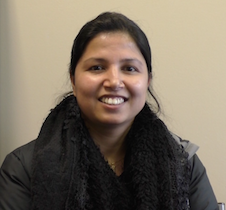 Myunik Panthi
Myunik Panthi
PhD candidate Sociology
After completing a Master of Philosophy that focused on older people, Myunik Panthi realised that it was where her passion lay.
“All over the world issues related to aging are rising - our populations are ageing, there are more elderly people particularly over the age of 85.
“I realised the need for support in all aspects; health support, social support and so on. I knew by undertaking research at an international level I could get experience that wouldn't be available otherwise.”
It was the calibre of her research supervisor that drew Myunik to the University of Otago. However, she was nervous about the prospect of coming to Otago because other than visiting neighbouring India, she had never left her home country of Nepal. New Zealand felt very far away.
Things were complicated by the Nepal Earthquake, which struck when Myunik was just days away from coming to New Zealand.
“It was hard to plan my journey because of the earthquake – I couldn't go home for nearly two weeks; during that time we had to sleep outside in the open. It was such a frightening situation – I didn't think I would survive. But luckily we were all safe, my husband, my son and I. My family was lucky, but more than 8000 people died.”
Although when she first arrived there were a few challenges (everyone spoke so fast and it was difficult to understand them at first) Myunik has found a very supportive environment.
“I really appreciate the support from everyone; my department, the international office, the graduate research centre, student support services. I've attended so many great workshops on presenting, writing, and literature reviews.”
Myunik is now a year into her PhD, which focuses on the leisure activities of elderly people and its impact on their wellbeing.
“Older people residing in rest homes need higher levels of care and support due to cognitive and physical challenges. The difference between the lives of older adults living at home compared to those in rest homes is huge.
“Regular involvement in meaningful activities is important for the health benefits - for reducing the risk of depression, loneliness, anxiety, dementia and Alzheimer's and for developing social relationships.
“My research aims to explore the relationship between leisure activities and well-being among older adults residing in rest homes. This study will employ a qualitative research design to generate in-depth understanding of the problem.”
Although her research is still in the early stages (she is currently recruiting rest homes for her project) Myunik is looking forward to attending international conferences and plans to continue her career in academia once her PhD is completed.